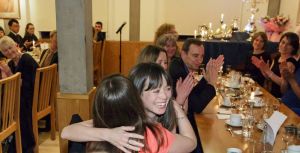Inspired by the evolving nature of Margaret Mason and Mary Shelley’s friendship, this month we’re reflecting on the moments of change that we have experienced. As Emily’s post revealed, some long-anticipated forks in the road have ended up continuing to lead us along parallel routes. But we have also stumbled on unexpected cross roads…
Emily and I first became friends when we were both living in Japan: her in a tiny apartment surrounded by carparks and convenience stores; me in a tatami-floored house that looked out onto rice paddies and groves of bamboo. In these very different environments, each of us picked up our pens.
Although we hadn’t yet come out to each other as aspiring writers, Emily and I began at weekends to take the three-hour round trip between her urban flat and my country home. This way, we forged our friendship in both the ice cream parlours of the neon-choked city and in bath houses hidden up dark mountain lanes.

But, after just one short season, we each had to decide in advance whether or not we would stay in Japan the following year. By the time the maple leaves had fallen from the trees, Emily had chosen to continue her unofficial writing apprenticeship in Matsuyama, enduring the chill of a second Japanese winter. I set my sights instead on a long trip with my boyfriend, imagining myself penning stories on sun-bathed verandas in Thailand, Vietnam and Laos.
Many messages pinged between the computer in Emily’s Japanese staffroom and the internet cafés I visited in Chiang Mai and Hanoi and Luang Prabang. On the surface, I was having the time of my life. But, although my boyfriend and I journeyed together all the way from Bangkok to Beijing, our relationship was falling apart.
While Emily was continuing to write fiction in between teaching lessons, I wasn’t jotting down much more than an angst-ridden journal. Looking back on it, I see just how easily I could have retreated into solitude during that time. And so I feel especially grateful that my faraway friend kept on making efforts to remain close.
When Emily and I both moved back to Britain, we continued our friendship – each of us, over the years, travelling thousands of miles across country to meet in Liverpool’s underground bars; riverside cafes in York; the walled garden of Ely cathedral; a Cumbrian bunkhouse; Portobello Market; a field in Herefordshire. More often than not, we’d come laden with drafts of each other’s novels that we had annotated in advance.
During those years of long-distance friendship, we anticipated the literary success of one before the other as a fork in the road, just beyond the line of sight. But, gradually, our writing lives became so intertwined and our vision of ‘success’ so complex and incremental, that jobs and awards and publications no longer felt like junctions that required much navigation.

I was delighted when, in 2011, Emily told me that she’d be moving to London. For the first time in a decade, she would live nearby. What’s more, she would be teaching at the same universities as me, so we’d also get to see each other each week at work.
Not long after Emily’s move, we embarked on co-writing literary journalism, sitting side-by-side at the same desk. I was newly single again, so it was all too easy to lose myself in work – especially work with Emily, which was so convivial, and always punctuated with shared meals: cinnamon buns; home-made soups; late-night dashes to the Turkish take-away for shish kebabs in spicy sauce.
But work, however fun, cannot replace a social life. This struck me one evening after a staff meeting, when Emily and I went off our separate ways. I’d come to miss our long-distance friendship, when we saw each other less often but, perhaps, prized our time together more highly.
When I eventually mentioned this to Emily, she immediately arranged a night out to a jazz bar, and we spent the evening listening to music and drinking cocktails and catching up on all those things we’d forgotten to tell each other while sat at a desk side by side.






